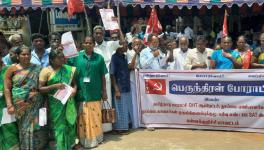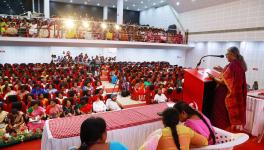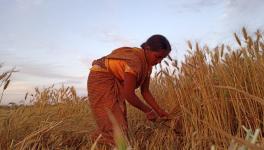Agricultural Workers an Integral Part of Ongoing Historic Struggle of Farmers
The unprecedented struggle in India to save agriculture and food security of the country from the claws of big corporates involved in agribusiness has turned into a mass movement. One of the reasons for the involvement of masses and growing support for the farmers’ movement is the sympathy of the public for the farmers. Apart from the peasants, a large section of the workers, including tenant farmers, other cultivators and landless labourers, depended directly and indirectly on agriculture, are part of the struggle.
Agricultural workers, since the beginning, have been involved in the movement. It may be a surprise for many as it is a general perception that several contradictions exist among farmers and the agricultural workers. It is also true to some extent. Recently, these contradictions reflected in the state of Punjab and Haryana in the form of wage rates for paddy plantation. However, if one looks at the composition of protesters at the protest sites on the borders of Delhi, a large number of agricultural workers are participating in the struggle. The basis of this unity is the impact the three laws would have on this section of society. This needs immediate discussion as the three farm laws, clubbed with the electricity amendment bill will change the lives of more than 14,43,29,833 (Census 2011) agricultural workers in India.
Reduction in Work:
With the implementation of these three laws, as it is quite evident, the support of the government to farm sector will further reduce. Farmers will not be assisted in form of agricultural implements such as seed, fertilisers, procurement etc. This is one of the major reasons for bringing this law. Then the priority of the government will be more and more on contract farming. Normally contract farming suits big farmers, but in absence of any government support, farmers from all sections, middle, small etc. will be under pressure to give their land on contract. This will directly impact agricultural workers. With the corporatisation of agriculture, there would be more mechanisation, which will reduce working days for agricultural workers. In contract farming, the first and foremost priority of the private company/corporate will be maximising their profit and it is best done by reducing the workers' cost. Therefore, big machines will be used, which will be displacing a large number of agricultural workers from their work.
With more contract farming, giant agribusiness houses will shift from labour-intensive crops to the crops where less labour is required, for example cultivation of paddy, where more manual labour is required. Shifting from paddy to some other crop will displace a huge number of labourers. Tenant farmers, who come largely from agricultural families, will also be directly affected. After adopting contract farming, they will not have access to any land as big corporates will have a monopoly in farming and they will enter in direct contract with only the landowners (producers).
Minimum Wages:
Minimum wage is the question where farmers and agricultural workers are normally seen on two opposite sides. But from experience, agricultural workers have learnt that the question of minimum wages is directly related to the question of Minimum Support Price. Minimum Support Price or MSP, as proposed by the Swaminathan Commission, is known as the comprehensive cost of production and is measured as C2+50 including all kinds of labour inputs. We consider that while calculating, the government must include the cost of hired agricultural workers at the rate of minimum wages—at least according to the minimum wages announced by the government itself. Until now, when farmers have not been getting MSP and are in miserable conditions (except few), they are not in a position to pay minimum wages to farm workers. There is no guarantee of MSP in the laws, contrary to the claims of the government, and it will change agriculture marketing in such a way that the procurement of crops on MSP will further reduce to a bare minimum—a dangerous position with all uncertainties of the market.
In this uncertain environment, farmers will not be in a position to estimate the cost of their crops, and hence, they will try to save the cost of cultivation by reducing wages of workers to avoid future loses. When farmers get MSP for their crops, then the struggle for minimum wages will be strengthened. Therefore, this struggle of farmers for MSP and procurement of agricultural produce at MSP is not separate from the struggle for getting minimum wages, which lends an issue-based strength to the ongoing struggle of farmers and agricultural workers.
PDS and Food Security:
With limited income sources, without land ownership and resources, most of the agricultural workers are dependent on social welfare schemes. Now, the Public Distribution System (PDS) has a central place among all the social welfare schemes of the government.
After the implementation of neoliberal economic policies, the ambit of social welfare schemes including PDS is being continuously reduced. The experience of the last 25 years of the neoliberal regime has exposed the lethal impact of these policies on the masses, especially on rural farm workers. Universal Public Distribution System has already been converted into a targeted one, which means numerous families have been pushed away from government support. Despite the tall claims by the Bharatiya Janata Party-led Union government and their IT machinery, there is clarity among masses on how the procurement of the food grains is going to be influenced in the future. The neoliberal policymakers in numerous leading newspaper opinion pieces are pleading in support of these laws and are saying that withdrawing them means halting similar laws, which are on the list of the government and their corporate lobbyists. There will be a further reduction in government procurement while promoting private purchasing in the absence of government market yards (dilution of APMC act) – which is a threat to national food security and it directly affects the PDS, a vital aspect of ensuring food for all.
The reduced purchase by the government will subsequently result in less availability of food grains for the government. In these conditions, advocacy for cash (through Direct Benefit Transfer) for food grains in PDS will become more prominent. Already, various international agencies under the leadership of the World Trade Organization and International Monetary Fund (IMF) are mounting pressure on India to change its PDS and reduce the subsidy for it. The experiment for the much-propagated system (cash for food grains) has already failed in some of the states in India. The PDS is very important for the rural poor as it is a system for the distribution of food grains at affordable prices and management of emergency situations.
Over the years, the term PDS has become synonymous with the term ‘food security’. A weak PDS and cash for food grains can become a disaster for a country where almost every fourth child is malnourished and half of all the women of reproductive age are anaemic. In India, 36% of children are underweight and 58% of children aged between 6 and 59 months are anaemic (National Family Health Survey data for 2015-16). Similar condition prevails when it comes to the rising number of children with stunting. According to the Comprehensive National Nutrition Survey 2018, 38.4% of the children are stunted and more than 50% of women in the reproductive age are anaemic. With these Acts, the nature of PDS will be changed forever, which will make India more undernourished than it is today.
With contract farming, more emphasis will be on the cash crops or crops more suitable for export than food grains, as there will more scope for profit. There is international pressure on India on this aspect as well. India has rich and diverse climate zones, rich soil diversity that can support diverse crops, which cannot be grown in the cold weather conditions prevalent in the West. These countries are pressuring India through international agencies to shift our farming from food grains to these crops. Farmers are also shown lucrative dreams for higher returns of their inputs in agriculture. It may sound good but in a globalised world, India cannot afford to rely on the import of food grains. This will put our food security in uncertainty and we have our bitter experience of pre-green revolution times when India was fighting with hunger. Agriculture workers, the majority of whom hail from the deprived sections of the society, will be the first victim of this insecurity.
Retail Inflation:
The amendments to the Essentially Commodity Act give freedom for criminal hoarding—most common tendency among traders for maximising profits. It restricts government regulation except in circumstances like war, famine, extraordinary price rise and natural calamities of grave nature. This further restricts the government to check the price rise of essential commodities in normal conditions. In other words, it legalises 100% retail inflation in the case of horticultural produce and 50% for non-perishable agricultural products. The profit-led inflation, which can be created by artificial scarcity through largescale hoarding, will force large sections of the agricultural workers to starve, and as discussed above, there will no PDS to rescue them. In normal conditions, even with the presence of Essential Commodities Act, it is commonly witnessed that agricultural workers fail to purchase food items for months, due to periods of high prices for items such as onion, tomato and sometimes pulses. When the whole food market is de-regularised, this condition will become the new normal.
Question of Land:
With the corporatisation of agriculture, the question of land will take new dimensions. Already there are strong apprehensions from the farmers over losing their lands to big corporates. If we do not consider this scepticism, even then, the vast scale entry of the big corporates to agriculture will open a new dimension and this will be detrimental for the hopes of millions of landless agricultural workers who are still waiting for their share of land. The most effective way of dispossessing the agricultural workers of their rights in the villages has been the non-fulfilment of land rights, a promise given to them at the time of independence. What is even worse is the reversal of land reforms in the last 20 years; the landless households in the countryside (possessing less than 0.01 hectare of land) increased from 35% to 49% during this period. The condition is so acute that 58% of Dalits continue to be landless.
There are legitimate various struggles underway for the land where the landless agricultural workers have to face the brunt of government authorities, forest officials, landlords or forest mafia. But with the new regime of corporates in agriculture, the struggle will be against corporates, which will be met with more brutal and stringent actions. In some states like Punjab, governments have already allowed entry of private companies into the village common lands, which was supposed to be distributed among landless rural masses.
This is a time when India is facing an all-time high unemployment and hunger, and international agencies are warning us about future hunger deaths due to starvation. There is a need to further strengthen our agricultural sector with the government spending more resources and developing a wider governance structure for cultivational needs, more elaborate procurement system ensuring MSP and a less post-harvest waste system. This would have increased income of farmers at one hand and strengthened our food security but our central government, which is seeing an opportunity in crises, is committed to inviting corporates and foreign capital while further opening its agricultural sector for exploitation. Here, the old colonial system of penury in plenty is sought to be revived.
Agricultural workers are an important part of this historic struggle, actively participating in it with the farmers, shoulder to shoulder. Agricultural workers constitute a large portion of the mobilisation on the borders of Delhi. This is a historic struggle, which is uniting people across economic, social and political backgrounds and is instrumental in the fight against the Hindutva politics of the Rashtriya Swayamsevak Sangh and the BJP to divide people. The essence of the struggle is to resist until victory.
(The author is the joint secretary of the All India Agriculture Workers' Union. The views are personal.)
Get the latest reports & analysis with people's perspective on Protests, movements & deep analytical videos, discussions of the current affairs in your Telegram app. Subscribe to NewsClick's Telegram channel & get Real-Time updates on stories, as they get published on our website.
























